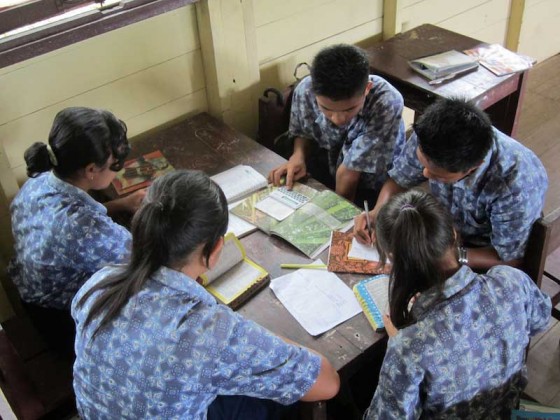
I arrived in Galinggang with three other people: a lecturer and two Masters students from Keio University in Japan. As their guide and interpreter, I had to speak English during my first days in Galinggang. This led to a chain of events that started with a knock on the door.
LET'S TEACH SOME ENGLISH
The principal of Galinggang’s middle school and her husband came quite late at night to ask me to teach English to the students. The school, SMP Negeri 2 Kamipang, has no English teacher this academic year. I thought, why not? This could be a way of getting to know people, and I could start with befriending the kids. I said yes.
I went to the school the next day and started my class. It was fun to be back in a classroom. The students were surprisingly enthusiastic, curious and very brave to raise their hands and answer my questions, even though English was so foreign to their ears.
AN IMPORTANT LESSON
I had to teach all grades. When I came to teach the ninth graders, the chapter was titled ‘Let’s Sing and Dance’. In line with the chapter’s name, all text and dialogue in the chapter were about songs and dances. We came across this short dialogue on one page of the book:
SURYA: “THERE’S SOME DOUBT IN MY MIND THAT BRITNEY SPEARS CAN REALLY SING WELL WITHOUT LIP-SYNC.”
KRISTIN: “I DON’T THINK THERE CAN BE ANY DOUBT ABOUT THAT. SHE CAN REALLY SING BEAUTIFULLY WITHOUT LIP-SYNC.”
(Okay, let’s not get trapped into Surya and Kristin’s debate. I’m sure Britney Spears has an amazing voice.)
Then, I translated the dialogue for my students. However, they looked bewildered.
I ASKED, “WHAT’S THE MATTER?”
ONE GIRL QUERIED, “BRITNEY SPEARS, SIR?”, WITH WOBBLY PRONUNCIATION.
I SAID, “YES, BRITNEY SPEARS. MAJOR POP STAR.”
THEY LOOKED AT EACH OTHER BLANKLY.
I ASKED AGAIN, “WAIT, DO YOU GUYS KNOW WHO BRITNEY SPEARS IS?”
All shook their heads.
“REALLY? YOU DON’T KNOW BRITNEY SPEARS?” I ASKED AGAIN.
“NO, WE DON’T.”
A COMMUNICATION BLACK HOLE
The absence of an electrical grid and telecommunications tower in Galinggang has major implications for access to information. How can you watch TV if there’s no electricity? How can you browse the internet if there’s no sufficient data network, or even phone network? How can you immerse yourselves in pop music if it’s almost impossible to download a song and charge your cellphone and MP3 player?
In Jakarta, I often say to my friends, “Hey, it’s 2013! Where have you been?! How come you don’t know about …” when they are not aware of a certain singer or actor or movie or song.
In our hyper-globalised world, why is it so important to be aware of all that is new and current in pop culture? How come we feel we have a right to deem other people demode? Is knowing about Britney Spears really more important than understanding the basics of English?
I believe that having access to information nowadays is every single citizen’s right. I can’t imagine living with a very limited amount of information, or, for that matter, no information at all. People need to know what’s going on in the world around them.
The people of Galinggang are largely at the mercy of the government, which will decide when the village gains access to the electrical grid, a telecommunications tower, and the flows of information that these technologies will bring.
OFF THE POP-CULTURE GRID
Back in the classroom, I was disappointed with this nationally distributed textbook: basing lessons around examples that are so far from the reality of my students’ lives. I didn’t want my pupils to be constrained by the dialogue imprinted on the book’s pages. It’s not the end of the world just because you don’t know who Britney Spears is.
For the record, the students are not completely in the dark when it comes to pop culture: they do know some contemporary artists such as Maroon 5, Adele and many K-Pop stars. It’s just their knowledge is limited by access to electricity and the internet. Their dismissal of Britney Spears or any other singers, in my humble opinion, won’t affect them much.
And I still see this: hands that are raised enthusiastically to answer my questions, bravery to speak a new language that’s sometimes nearly impossible to pronounce, and curiosity to learn the meaning of new words.
Ultimately that is what is really important. Much more so than knowing every single word to “Oops… I Did It Again”.


